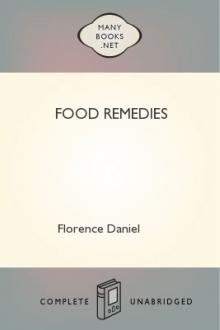The Chemistry of Food and Nutrition, A. W. Duncan [i love reading .txt] 📗

- Author: A. W. Duncan
- Performer: -
Book online «The Chemistry of Food and Nutrition, A. W. Duncan [i love reading .txt] 📗». Author A. W. Duncan
There is a general similarity in the effects of stimulants on the digestive and nervous systems. The most largely used stimulant is ethyl alcohol, and as its action is best known, it may be useful to name the principal effects. Alcohol in the form of wine and spirits, in small quantities, first stimulates the digestive organs. Large quantities inflame the stomach and stop digestion. (Beer, however, retards digestion, altogether out of proportion to the alcohol it contains.) Alcohol increases the action of the heart, increases the blood pressure, and causes the vessels of the whole body to dilate, especially those of the skin; hence there is a feeling of warmth. It the person previously felt cold he now feels warm. The result of the increased circulation through the various organs is that they work with greater vigour, hence the mental faculties are brightened for a time, and the muscular strength seems increased. The person usually feels the better for it, though this is not always the case; some have a headache or feel very sleepy. It has been repeatedly proved that these good results are but transitory. The heart, although at first stimulated, is more exhausted after the action of the alcohol has passed away than it was at first. This is true of all the organs of the body which were stimulated. In consequence of the dilatation of the blood vessels of the skin, an unusual quantity of heat is lost and the body is cooled. After taking alcohol persons are less able to stand cold. When overtaken by snowstorms or subjected to excessive or prolonged cold, it has often happened that those who resorted to spirit drinking have succumbed, whilst the others have survived. Insurance statistics have conclusively shown that teetotallers are longer livers than the so-called moderate drinkers. The terrible effects on both body and mind of the excessive drinking of alcohol, or the use of other strong stimulants or narcotics, are too obvious to need allusion to here; we are only concerned with what is vaguely called their moderate use.
The stimulation produced by tea and coffee is in some respects like that of alcohol. The heart is stimulated and the blood pressure rises. The kidneys are strongly affected in those unaccustomed to the drug, but this ceases after a week or more of use. Their chief effect is on the brain and nervous system.
Many have boasted that they can take of what they call the good things of life to their full, without any bad effect, and looking over a few years, or even many years, it seems a fact. Some of us have known of such men, who have been esteemed for their joviality and good nature, who have suddenly broken down at what should have been a hearty middle life. On the other hand there are men who were badly equipped for the battle of life, with indifferent constitutions, who never had the buoyancy and overflow of animal spirits, but who with care have long outlived all their formerly more robust but careless companions.
Simple versus Highly-flavoured Foods.—It is very difficult to decide to what extent condiments and flavourings should be used. These have stimulating properties, although differing from the more complex properties of alcohol and the alkaloids. The great differences in the dietetic practices of nations does not appear to be in conformity with any general rule. It varies with opportunity, climate and national temperament; though doubtless the national temperament is often due in part to the dietetic habits. Some races are content with the simplest foods, large numbers subsist chiefly on rice, others on the richer cereals, wheat, oatmeal, etc., and fruit. On the other hand there are races who enjoy stronger flavoured food, including such things as garlic, curry, pickles, pepper, strong cheese, meat extracts, rancid fats, dried and smoked fish, high game or still more decomposed flesh, offal and various disgusting things. The Greenlanders will eat with the keenest appetite, the half-frozen, half-putrid head and fins of the seal, after it has been preserved under the grass of summer. In Burmah and Sumatra a mess is made by pounding together prawns, shrimps, or any cheap fish; this is frequently allowed to become partially putrid. It is largely used as a condiment for mixing with their rice. Numerous examples of this sort could be given. There is scarcely anything that it is possible to eat, but has been consumed with relish by some tribe or other. The strongest flavoured, and to our minds most disgusting foods are eaten by the least intelligent and most brutal races. It is hunger that compels the poor African bushman to eat anything he can get, and the Hottentot not only the flesh, but the entrails of cattle which die naturally, and this last he has come to think exquisite when boiled in beast-blood. All this shows a wonderful range of adaptability in the human body, but it would not be right to say that all such food is equally wholesome. The most advanced and civilised races, especially the more delicately organised of them are the most fastidious, whilst it is the most brutal, that take the most rank and strongly flavoured foods. Even amongst the civilised there are great differences. The assimilative and nervous systems can be trained to tolerate injurious influences to a remarkable degree. A striking example is seen in the nausea commonly produced by the first pipe of tobacco, and the way the body may in time be persuaded, not only to tolerate many times such a quantity without manifesting any unpleasant feelings, but to receive pleasure from the drug. Opium or laudanum may be taken in gradually increasing quantities, until such a dose is taken as would at first have produced death, yet now without causing any immediate or very apparent harm. Nearly all drugs loose much of their first effect on continued use. Not only is this so, but a sudden discontinuance of a drug may cause distress, as the body, when free from the artificial stimulation to which it has become habituated, falls into a sluggish or torpid condition. For the enjoyment of food two things are equally necessary, a healthy and keen appetite and suitable food; without the first no food, however good and skilfully prepared, will give satisfaction. The sense of taste resides in certain of the papilloe of the tongue, and to a much less degree in the palate. Tastes may be classified into sweet, bitter, acid and saline. Sweet tastes are best appreciated by the tip, acid by the side, and bitter by the back of the tongue. Hot or pungent substances produce sensations of general feeling, which obscure any strictly gustatory sensations which may be present at the same time. To affect the taste the food must enter into solution. Like the other senses, taste may be rendered more delicate by cultivation. Flavours are really odours, and the word smell would be more appropriate. For example, what we call the taste of an onion, the flavour of fruit, etc. (independent of the sweetness or sourness of the fruit) is due to the nose.
Much has been written on the necessity of making food tasty, so as to stimulate the appetite and digestion. It is urged that unless this is done food will not be eaten in sufficient quantity. Innumerable receipts (some very elaborate) have been published for this purpose. All this is supposed to increase the enjoyment of food. The Anglo-Saxon race—the race whose dietary is the most elaborate—is especially subject to digestive derangements, and without good digestion and the consequent healthy appetite, no food will give full gustatory pleasure. The most wholesome food, and that which can be eaten most frequently without weariness, is mildly flavoured and simply prepared. Plain bread is an example; whereas sweet bread, currant bread, etc., though agreeable in small quantity, or as an occasional delicacy, soon palls on the appetite. Rice is the poorest and mildest flavoured of the cereals, it is therefore often, perhaps generally, made more tasty by the addition of fish, curry, etc. The bulk of the Chinese live on rice, with the exception of only 3 or 4 ounces of fish per day, and they are a fine, big and strong race. The Japanese labourer lives on similar food. In India rice is the food most in use, though many other cereals are eaten there. Other races live chiefly on fruits. It appears that the digestive organs will perform their functions perfectly with the mildest flavoured food. There is nothing surprising in this. The strongest, most intelligent, and largest animals are those which feed on grass, herbs and fruits. Even the African lion is no match for the gorilla. The lion and tiger are capable of great strength, but they cannot put it forth for long periods as can the herbivora. Our most useful animal, the horse, can exert much more muscular energy, weight for weight, than any of the carnivora. The cost of feeding one of the herbivora is much less than that of one of the carnivora of the same weight. This is so whether we take the cost of purchasing the food; or the expenditure of time, labour and energy on the part of man or of natural forces in the production of the food. Herbs, roots, corn and fruit are produced much more abundantly and freely than the corresponding quantity of sheep, deer, etc., on which the carnivora feed.
The restlessness, craving for novelty, and love of excitement, so characteristic of the Anglo-Saxon, and to a less extent of some other European races, has its correspondence in the food of these races. Highly-seasoned and nitrogenous foods act as a stimulant and favour spasmodic, and for a time perhaps, great intellectual and physical exertion, with a succeeding period of exhaustion. Simpler food favours long, sustained, uniform muscular strength, clearness of intellect, and contentment. Let no one misunderstand us; we do not assert that all who live on simple food have either clear intellects or are contented, because there are other factors besides food, but that such qualities are more easily retained or obtained under that condition. It is well





Comments (0)